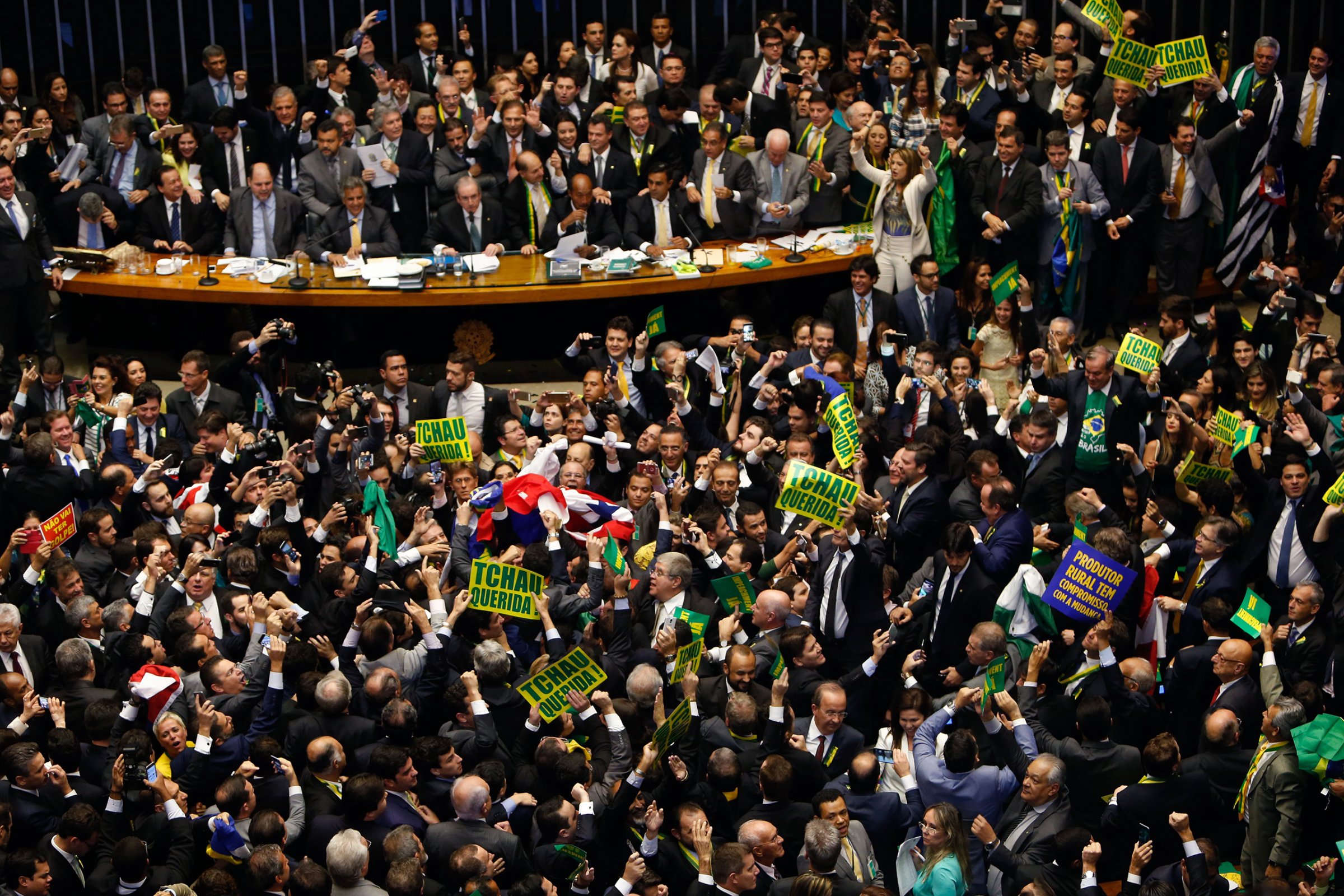
Brazil’s President Dilma Rousseff, like her predecessor Luiz Inácio Lula da Silva, has a radical past. Once deemed the “Joan of Arc of the guerrillas” by a martial prosecutor, her insurrection against the country’s 1964-85 dictatorship saw her imprisoned and tortured by the military. She famously refused to divulge information, knowing it could prove fatal for her companions.
Read More: Brazil’s Top Court Rejects Bid to Block Impeachment of President Rousseff
Now, four decades older, as she stands on the precipice of a crucial vote in her battle to avoid impeachment, some of her former comrades say they can muster only lukewarm support for her survival. “Many of us are deeply critical of the government,” says Cid Benjamin, a journalist and former guerrilla who was a member of the Revolutionary Movement of the 8th October, an armed group that originated in Rio de Janeiro and fought against the dictatorship.
Impeachment moved closer after Brazil’s lower house of Congress voted late Sunday to impeach Rousseff, despite her arguments that the push against her was a “coup.” The measure now goes to the Senate. If by a simple majority the Senate votes to take it up and put the president on trial, Rousseff will be temporarily suspended.
In that case, Vice President Michel Temer would take on the presidential duties and the Senate would have 180 days to conduct a trial against Rousseff. Senate leader Renan Calheiros has suggested his body would consider the measure within a month, but no date has been set.
Many years have passed since Rousseff’s guerrilla days, and since Lula, then a firebrand union activist also detained by the regime, founded the Workers’ Party (PT) in 1980. The party is now severely damaged by Operation Car Wash, a $3 billion corruption investigation that has alleged state funds were funneled to Rousseff’s 2014 election campaign and politicians from many leading parties in Congress, including the PT. There is no evidence Rousseff personally profited, but with the economy in recession, she is facing impeachment for unrelated accounting irregularities.
While her former comrades in arms say they still respect what she did in the 1960s and ’70s, “the PT betrayed their promise against corruption” after taking power in 2003, says Benjamin, who like many of his comrades was a founder of the party in 1980. “They could have reformed the country, but they did not. Dilma is not personally corrupt, but her government has been open to corruption. That is clear.”
Read More: Brazilian President Prepares for Her Next Impeachment Battle
Many of the PT’s earliest supporters defected to the newly formed Socialism and Freedom party (PSOL) the year after the PT took the power at the fourth attempt. The PSOL sits to the left of Rousseff on many economic and social issues. “The PT was a big innovation and had a transformative program,” says Ivan Valente, a federal deputy from São Paulo who was tortured and exiled by the military before becoming a founder of the PT and later joining the PSOL. “But when they chose power at any cost, their attitude changed. Corruption reduces your credibility.”
But, Valente and Benjamin say, they are determined that despite their differences, the impeachment motion, which they say is anti-democratic, must fail. “It is a conspiracy to overthrow the government, an interruption of the democratic process,” Valente says. “The PMDB is full of corruption. Temer would not have legitimacy, and his government would try to shut down Operation Car Wash.”
But some early supporters are supporting impeachment.
Hélio Bicudo, 93, a human-rights campaigner and early supporter of the PT, actually filed the motion of impeachment being debated, which cites a court ruling that Rousseff had broken the law by using state bank funds to cover a shortfall in government accounts before last year’s general election. Quoting a line from the national anthem, along with two others, he urged house speaker Cunha in a letter: “You’ll see that your son does not run from a fight.”
Bicudo declined to talk to TIME, but in an interview last year he was reported to have said, “The PT was created as a democratic party to fight for democracy in Brazil. But soon this became an empty ideology. In fact, the party became the springboard for the exercise of power by a certain number of people.”
On Friday, Rousseff canceled a planned national television address as both sides in Congress claimed they had sufficient votes to triumph on Sunday. The atmosphere in the lower was animated as dozens of lawmakers spoke for and against impeachment, some shouting at the tops of their voices.
Read More: Grounds Exist to Impeach President Rousseff, Brazilian Congress Report Says
Solicitor General Jose Eduardo Cardozo argued that as Rousseff has not committed a crime, her impeachment would constitute an act of “violence without precedent” against democracy in Brazil. But Miguel Reale Junior, another co-author of the impeachment petition, said Rousseff’s accounting techniques had led directly to Brazil’s recession, with high inflation, soaring unemployment and a fall in value of the currency. “Are you going to tell me that isn’t a crime?” he asked.
Additional reporting from the Associated Press
More Must-Reads From TIME
- The 100 Most Influential People of 2024
- Coco Gauff Is Playing for Herself Now
- Scenes From Pro-Palestinian Encampments Across U.S. Universities
- 6 Compliments That Land Every Time
- If You're Dating Right Now , You're Brave: Column
- The AI That Could Heal a Divided Internet
- Fallout Is a Brilliant Model for the Future of Video Game Adaptations
- Want Weekly Recs on What to Watch, Read, and More? Sign Up for Worth Your Time
Contact us at letters@time.com